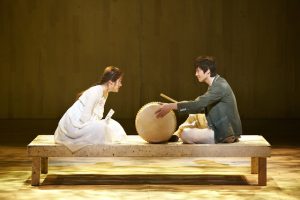Podcast: Play in new window | Download (Duration: 1:03:10 — 71.9MB) | Embed
Subscribe: Spotify | TuneIn | RSS | More
Last month Oxford University Press published my dear friend David Savran’s Tell It to the World, a monumental study on transnationalism and the Broadway-style musical. The book focuses on two specific markets: South Korea and Germany. To help David get the word out about his book, over the next few weeks I am featuring two different episodes of Countermelody in which David and I discuss the themes and concerns of the book, as well as playing short musical examples to illustrate those points. Today’s episode focuses on South Korea and the influx of US-influenced musical styles to the country from the 1920s through to KPOP. We hear examples of the American influence on Korean popular music, from the first Korean singer to record Western-style music in the 1920s, the tragic Yun Sim-deok, through to the breezier (and occasionally psychedelic) musical stylings of such 60s pop groups as The Kim Sisters and He5, through to the folk-pop of the intense Kim Kwang-Seok and the innovative yet tradition-infused music of fusion groups Ensemble Sinawi and Jambinai. David also explains how Seoul became a center for musicals in Asia, with American musicals like Dreamgirls adapted for a specifically Korean audience, while also discussing a number of popular Korean musicals, most of them with Korean themes: Hero, The Days, Frankenstein, and Seopyeonje. This last work is based on a popular 1993 film; and both works, film and musical, spearheaded the resurgence of interest in the tradition of pansori, a uniquely Korean brand of dramatic solo theatrical performance dating back to the 18th century. Finally, and inevitably, there is a discussion of how KPOP has “infiltrated” the Korean musical, particularly with the brief appearance on Broadway of the musical KPOP.
Countermelody is a podcast devoted to the glory and the power of the human voice raised in song. Singer and vocal aficionado Daniel Gundlach explores great singers of the past and present focusing in particular on those who are less well-remembered today than they should be. Daniel’s lifetime in music as a professional countertenor, pianist, vocal coach, voice teacher, and journalist yields an exciting array of anecdotes, impressions, and “inside stories.” At Countermelody’s core is the celebration of great singers of all stripes, their instruments, and the connection they make to the words they sing. By clicking on the following link (https://linktr.ee/CountermelodyPodcast) you can find the dedicated Countermelody website which contains additional content including artist photos and episode setlists. The link will also take you to Countermelody’s Patreon page, where you can pledge your monthly support at whatever level you can afford.
